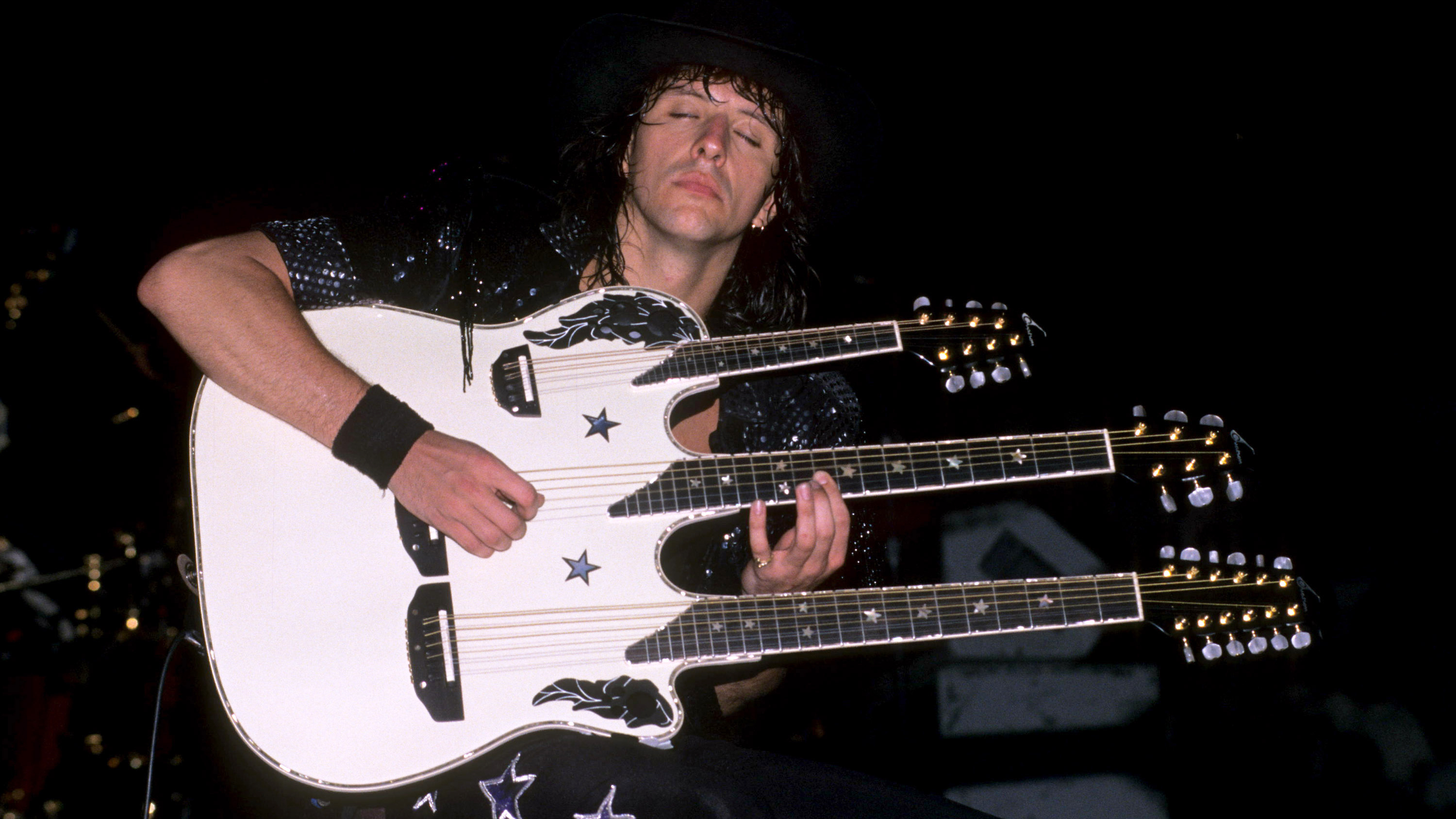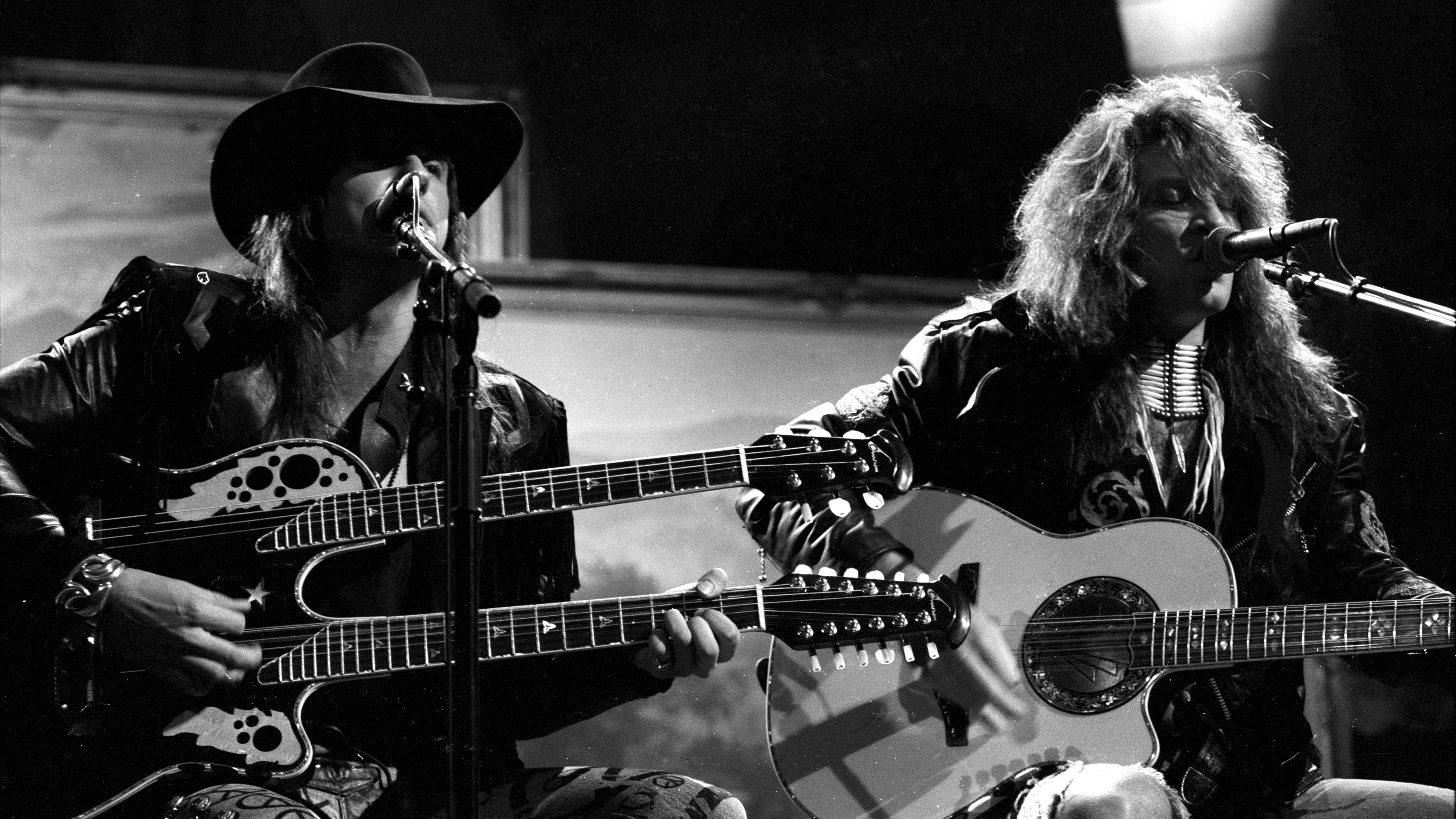
With over 120 million albums sold, according to the Recording Industry Association of America, Bon Jovi are one of the biggest rock bands of all time. Things weren’t always rosy for the five-piece, though. After disappointing sales of their second offering, 1985’s 7800° Fahrenheit, the writing was on the wall: it was now or never.
The songwriting duo of Jon Bon Jovi and guitarist Richie Sambora had
already worked with outside writers and even deigned to allow keyboardist David Bryan and drummer Tico Torres to contribute a few ideas. However, during pre-production for their third album, Slippery When Wet, a dyed-in-the-wool hitmaker was employed to pep up the music. That man was Desmond Child, who came with a hearty recommendation from KISS’s Paul Stanley. He had helped write I Was Made For Lovin’ You, after all.
Child has a writing credit on three Slippery tracks in total, his notable contributions including the album’s platinum-hewn cornerstones Livin’ On A Prayer and You Give Love A Bad Name – both iconic songs that hit the top spot on America’s Billboard Hot 100 list.
So Wanted Dead or Alive is a parallel between the cowboy and rock, and it’s really the truth... It’s honest; that’s one thing about us, we’re serious
Richie Sambora
By the time the album’s third single, Wanted Dead Or Alive, was released, the band were household names but the song represented something of a departure from its forerunners – and was written by Jon Bon Jovi and Sambora as a duo. “That song, in particular, is my favourite on the record,” Sambora told Guitarist magazine in 1986.
“It has more emotion in the lyrics and tune, because it’s about us. I feel like I’m a modern-day cowboy. The old cowboys would be bank robbers: they’d ride into town, rob the bank, go to the bar, drink the booze, steal the women, take the money and run, and we do the same thing!
“So Wanted Dead or Alive is a parallel between the cowboy and rock, and it’s really the truth," Sambora added. "It’s honest; that’s one thing about us, we’re serious.”
In 2022, co-writer Jon Bon Jovi shared his own perspective on the inspiration behind the song in a SiriusXM interview with singer Pink in which he fielded fan questions.
"Life on the road – at that point we were well into our second album and we had toured the world both on the first and the second record," reflected Bon Jovi. "So you go from dreaming about what it's like to be on the road to actually doing it for a living. Then as an opening act you are a nomad and you're under the house rules or any and everyone else you're opening for, so you learn how to be a performer and you learn how to travel. So that's what the road was all about."
Though its parallels were drawn in Bon Jovi's present, from the outset, Wanted Dead Or Alive brings the Wild West to mind, with its gusts of synthesized wind and a mournful rhythm backing up the melody plucked by Sambora on an Ovation acoustic guitar. As proceedings build to a suitably chest-thumping climax, the onus switches to the electric guitar (“The whole record was recorded with Stratocasters, which is a new departure for me,” Richie commented). Sambora then pulls off a blistering solo before riding a steel horse and the remainder of the song off into the distance.
The night before the Slippery tour, I thought to myself that I’d really like a double-neck acoustic
Swapping guitars is all very well in the studio, but what about live performances? There’s not even a single change – the song requires switching between six and 12-string acoustics before shifting again to an electric. And as the band embarked on a wave of global fame that has yet to come crashing to Earth, a string of tour dates stretched before them. Sambora, being the showman he is, had an unusual solution to the impracticalities of playing Wanted Dead Or Alive onstage.
“The night before the Slippery tour, I thought to myself that I’d really like a double-neck acoustic,” Richie told Guitarist magazine for a 1990 cover story. “So I approached Ovation and said that I’d like to have something as a trademark – the hat and the double-neck.
“We hadn’t had any kind of phenomenal success at that point; they had McCartney, The Rolling Stones and all these big acts, and they weren’t sure that they could spend all this stuff on me. I said, ‘Look, I’m telling you, I have a hit record here. I’m going to tour the world for the longest time and if you don’t give this to me, I have another company that will!’”

Ovation relented in return for some consultative work on the now-defunct KMD amp line and built Richie a pair of D768 double-necks for the first part of the Slippery world trek. But the story doesn’t end there, as Sambora related: “Then I said to them, ‘You’re not going to believe what I want now’. And they said, ‘A triple neck?’ I went, ‘Yeah!’ Then they said, ‘How? The [string] tensions will be crazy!’
I said, 'Look, I’m willing to use my own money to help you fund this guitar’
“It really costs a lot of money to make this kind of thing, because they have to pull people off their assembly lines for the handmade stuff they do," Sambora told Guitarist. "I said, ‘Look, I’m willing to use my own money to help you fund this guitar’. It was quite a process and I believe that each triple-neck is worth about $50,000 – not in materials, but as far as what it costs the company to make them.
“They really worked it all out and the things stay in tune and work every night. It goes through one of those Boss chorus pedals and they put a little delay on it, and that’s it.’
The third neck at the top added a mandolin to the mix – and you can hear it in action during a Zeppelin-esque intro in the clip above from Bon Jovi's set at Moscow's Music Peace Festival in 1989.
In later years, Taylor Guitars supplied Sambora’s multi-necks, and he downgraded to ‘just’ a double with a six-string and a 12-string guitar. He parted ways with Bon Jovi in 2013 (to be replaced by Phil-X) and continues to perform the Wanted Dead Or Alive as a solo performer. In 2018 Sambora's return to Ovation was announced with a special signature model. The guitarist's royalties from sales of the RSE225-5 Signature Series Elite Double Neck benefitted youth music programs.
It’s all come full circle now
“They worked with me to help create my original acoustic double neck when nobody else could even figure out how to make one!" commented Sambora. "It’s all come full circle now that these new models will help benefit the next generation of players.”
Though the mandolin was gone alongside the six-string guitar, the all-important 12-string remained a part of the signature model.
"I come out and do a little prelude to Wanted... with the 12-string," reflected Sambora to Guitarist magazine. "Then, all of a sudden, the wind and the low keyboard comes in and you feel like you’re in a Western town somewhere."







